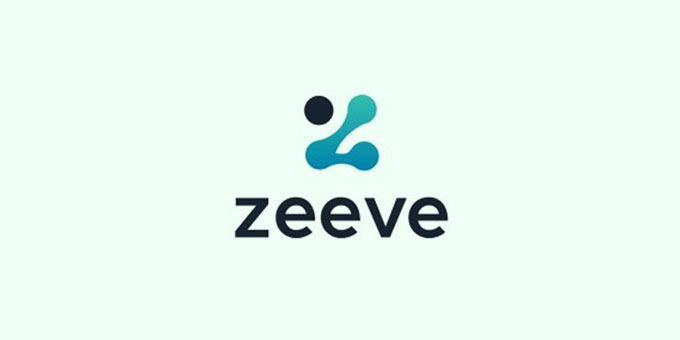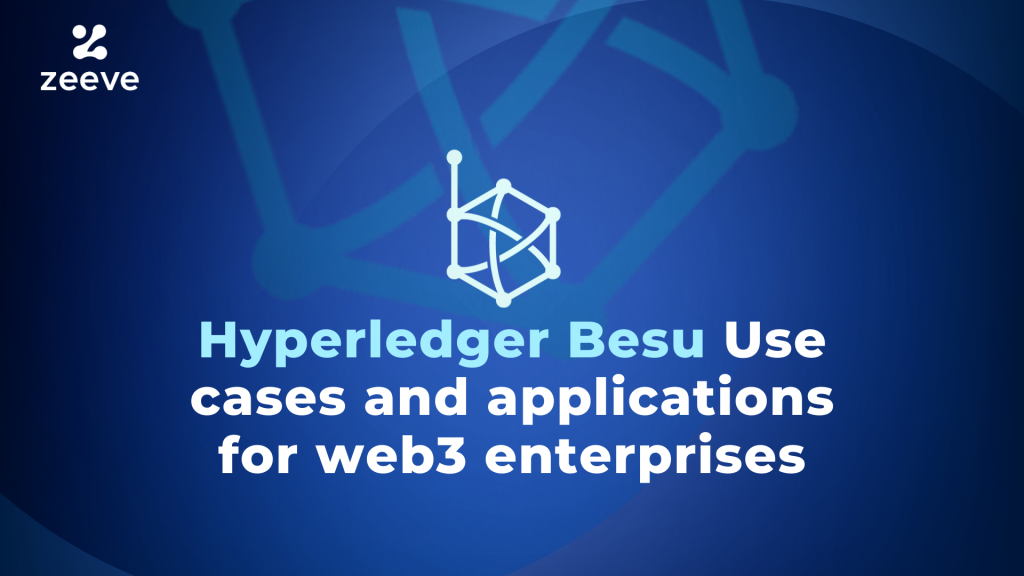Hyperledger Besu is an open-source Ethereum client designed under Hyperledger’s umbrella project. Besu is different from Hyperledger’s other projects because Besu is based on Ethereum and is built under Apache licensing while written in Java language. Hyperledger besu is an ideal solution for enterprises that want to build private and permissioned blockchain use cases, but they also want to maintain interoperability with public blockchain like Ethereum. Also, Besu is being widely adopted by both public and private sector enterprises due to its highly feasible features, such as full EVM compatibility, end-to-end security of the chain which enables development of high-performing and scalable dApps.
To further understand the prominence of Hyperledger Besu in the blockchain space, we will explore the top Hyperledger Besu use cases for web3 enterprises. The analysis will help you understand how Besu is simplifying the operations for a range of enterprise use cases like custom decentralized applications .
Who should build on Hyperledger Besu?
Hyperledger Besu is a suitable ecosystem for enterprises that seek to leverage the features and functionalities of a public blockchain (like Ethereum), but they want their blockchain to remain private to the authorized members (nodes). Further, Besu’s modular architecture makes it a viable choice for enterprises that want customization on their blockchain network to serve use case-specific needs. Leveraging this customization benefits, you can add specific security features to your projects, like who can publish smart contracts, how data can be accessed, and how validators can participate in the validation process.
Additionally, Hyperledger Besu further offers a range of innovative features and functionalities. For example, Besu is fully compatible with the Ethereum ecosystem, thus enabling EVM implementation on blockchains without any modification in the existing codebase. Hyperledger Besu also improves scalability for your blockchain network since it manages the transactions initiated by only the authorized entities– nodes in a consortium environment.
Hyperledger Besu is further designed to be interoperable with various EVM-based blockchain and other Ethereum clients. Hence, Besu achieves interoperability as well. Being open-source, Hyperledger Besu welcomes all kinds of web3 projects and enterprises to build on its ecosystem by leveraging the available ecosystem in line with Ethereum blockchain-based tools and resources, including a block explorer, statistics dashboard, and command-line interface. If you want to learn more about what makes Hyperledger Besu a suitable solution for web3 developers and enterprises, read our detailed guide below: Decoding Hyperledger Besu for developers
What are the use cases and applications of Hyperledger Besu?

As discussed, Hyperledger Besu offers a range of features along with its adherence to Enterprise Ethereum Alliance (EEA) Client Specification and the ability to offer functionalities and security capabilities of both the public (Ethereum) and enterprise-grade blockchains. All these things make Besu a compelling choice for launching customized, innovative use cases for both private and public enterprises. Let’s learn about the top Hyperledger Besu use cases, including the real-world use cases and the possible use cases for future:
Supply chain management:
Supply chain is the most prevalent use case of Hyperledger Besu for web3 enterprises. With Besu, enterprises can build custom web3 applications for tracking the movement of goods in a private, permissioned, and fully customized supply chain ecosystem where crucial data and information are shared with only authorized stakeholders. Meanwhile, by using Besu’s EVM compatibility feature, the blockchain network can interoperate with a range of public blockchains and all other Ethereum clients.
Hence, Hyperledger Besu can be utilized to build Ethereum-based supply chain solutions with great permissioning features for industries spanning healthcare, government sectors, and logistics. As discussed, these solutions can be integrated with custom functionalities, securities, and validator node-related parameters to monitor logistics more efficiently, provide secure and private data access, and meanwhile allow the supply chain ecosystem to interact with other Ethereum-compatible blockchain networks.
Digital identity solutions:
Healthcare sectors, government institutions, universities, finance, and other types of enterprises face security challenges such as identity theft, fraud, manipulation of patient records, false voting, and many more. Hyperledger Besu allows such organizations to build their dApps on a fully private and permissioned blockchain where endless customizations can be done through Besu nodes and account permissioning features. Hence, only authorized members like students, patients, and voters can view, access, and verify the data.
The designed solutions can run on the Ethereum mainnet, and testnet like Sepolia and Gorli. However, if an enterprise wants to deploy fully decentralized public network use cases, then Hyperledger Besu provides all the stack and support to build such use cases. If enterprises want to build other solutions that need to be completely decentralized and publicly available, then provide support for this as well. LACChain, BAXE, Izertis, and Howest University of Applied Sciences are some of the organizations that are leveraging Besu to build their own use case-specific digital identity-based solutions.
Government and public sector operations:
Government and public sector see a strong potential in Besu’s ecosystem. For example, blockchain-based land registry system has appeared as an innovative use case for both the central and state authorities. With Hyperledger Besu, all the confidential data related to the registry can be authenticated by numerous validator nodes while the security of data is preserved since the network is private & permissioned with no centralized authorities involved, just the buyer and seller of the property.
With its public and permissioned features, Besu provides a hybrid blockchain ecosystem for government authorities and other public sector enterprises to blockchain-based land registry solution that can promote privacy through its private and permission features while enabling the members to interact with members of other networks via the Hyperledger Besu’s compatibility with various EVM-compatible public networks and all the other Hyperledger projects.
Speaking about the real-world Hyperledger use cases— Inter-American Development Bank (IDB), along with its partners, launched LACChain has created a Besu-based land registry system that serves as a digital portal for recording all the details about the registry, authenticates the identity of buyers/sellers, and enhances the transparency and traceability across the whole system. Hence, there is no room for fraud and registry document counterfeiting.
Next can be voting. Besu Hyperledger Besu facilitates the development of DLT-based solutions that can be utilized for voting in both public and private sector enterprises. Government can use voting solutions such as decentralized ballot boxes that accept votes from voters, record the immutable data, and authenticate the identity of voters, thereby eliminating any kind of fraud during the count.
Likewise private enterprises can use Hyperledger Besu to build a private and permissioned voting system for their shareholders, accepting votes from them during all types of meetings, including annual general meeting, shareholders’ meeting, and so on. Besu allows enterprises to customize their voting solution as per their regulatory compliance while granting data access to only the shareholders to ensure privacy and integrity.
Iberdrola– a global renewable energy leader, has developed a decentralized voting solution using Hyperledger Besu to manage voting and proxy voting at their General Shareholder’s meeting. The organization has enhanced its existing voting portal, enabling both the shareholders and proxy holders to ensure that their votes have actually been recorded and telematic attendance is successfully registered across the distributed ledger. Plus, only the authorized shareholders and proxy voters can access the voting-related information, which maintains privacy, and confidentiality for preventing frauds.
Banking and finance applications:
Renowned banks like JPMorgan, Goldman Sachs, and HSBC are adopting blockchain technology for faster payment settlement, easy cross-border transactions, and efficient KYC and other security compliance. However, with Hyperledger Besu, financial institutions can create their own permissioned blockchain to keep their network closed to their members and investors. Meanwhile, this network can communicate with other public banks (running on EVM-compatible chains) by leveraging Besu’s interoperability features.
Public Mint Inc– a renowned fintech firm has built their blockchain-based banking and investment platform with Hyperledger Besu to make their decentralized banking services accessible to all. The organization has also launched synthetic dollars on its blockchain, which is an on-chain representation of real fiat currency, but the problem of volatility and complexity do not occur here. In line with investors joining their investment program, Public Mint also welcomes people from all across the world to build novel fiat-based applications and services on the Public Mint ecosystem, making the ecosystem more feasible.
Another Hyperledger Besu use case for finance and banking enterprises is the settlement of bonds. Besu has served as infrastructure to prominent enterprises like Asian Development Bank and the Iberclear, enabling them to build powerful solutions to manage bonds with public and permissioned features. Asian Development Bank has leveraged Besu in line with Hyperledger Iroha, and Corda to build Tridecagon– a proof of concept project that settles all their cross-border bonds through an innovative DvP– delivery versus payment concept. Besu further helps their project to achieve interoperability with other networks, such as foreign exchange and local settlement authorities, to make the process smoother and reduce the bond settlement times.
Energy sector applications:
Hyperledger Besu use cases in the energy sector can be utilized for various operations such as tracking energy consumption, managing the certificates on the distributed ledger, and allowing for secure and transparent trading of renewable energy across a permissioned or public permissioned blockchain network– as required.
If we look at real-world applications, The BIS Innovation Hub and the Hong Kong Monetary Authority (HKMA) have together built digital platforms that allow individuals to invest in safe energy bonds, which are utilized to build green projects. Investors can use this platform (app) to track real-time details about how much clean energy is generated and the reduction in CO2 emissions. Also, these investors, if they want, can sell their energy bonds within a transparent market.
NFT/ Media and entertainment:
Hyperledger Besu allows NFT projects to create their own private blockchain with their organization-specific regulatory compliance. Plus, by leveraging low transaction cost and high scalability from Besu, projects can increase the throughput time while they can contribute to environment sustainability with low gas consumption.
Palm Studio, a Del-based NFT ecosystem, has created Palm Network— an NFT-focused blockchain platform running on the Hyperledger Besu that bridges to the Ethereum mainnet for leveraging its ecosystem technologies and tools. Their platform empowers brands, artists, and NFT creators to deploy their NFTs, abiding by the regulatory aspects of the network.
Healthcare & pharmaceutical:
Healthcare institutions– including government and private sector enterprises can use Hyperledger Besu to build a private blockchain that stores patient’s records digitally, their medical history, prescriptions, drug dosage, and clinical trial data. The blockchain will offer a secure and privacy-enabled atmosphere where only healthcare professionals and patients can access, manage, and authenticate their health-related information. Any outsiders will not be able to see or access such sensitive data. However, the members can still interact with public, EVM-compatible blockchain networks for the purpose of patient identity verification or sharing/transferring any crucial information. Organizations can also issue blockchain-based health passes to individuals, which streamlines their treatment-associated activities like appointments, health insurance claims, and travel requirements.
Education sector:
Popular universities, including University of Birmingham, have been using blockchain technology to issue academic certificates and also to store the immutable records of students to avoid counterfeiting. While universities are free to choose a blockchain based on their requirements, Hyperledger Besu again appears as a perfect fit for academic use cases because it allows for the creation of a private and permissioned network that only allows members of the university to access, authenticate, and upload information to the ledger. However, the members can also leverage Besu’s interoperability feature to communicate with other EVM-based blockchain networks that are isolated.
A real-world application of this is the Caribbean Examination Council. The organization has created a blockchain-powered Academic passport using Hyperledger Besu and LACChain as blockchain ecosystems for their Caribbean project. The project has tackled the challenges of the paper-based way of issuing, storing, and verifying their student’s academic credentials. Now, students can obtain their credentials and securely store them within a digital wallet. Whereas, the council members can easily access and verify the credentials available in the digital format. Hence, the solution is a win-win for both students and members.
Real-world asset tokenization:
Hyperledger Besu’s private and permissioned architecture, combined with enterprise-grade security & privacy feature, is ideal for tokenization of real-world assets (tangible or intangible) like real-estate properties, equities, carbon credits, commodities, investment funds, CBDCs & bonds. Retail, supplychain, art & collectibles and fintech industries can use Hyperledger Besu for asset tokenization, transferring the economic value of real-world or off-chain assets’ economic value and ownership into distributed ledger. This further helps them track counterfeit goods, fostering traceability, security, and trust.
Bank of International Settlements (BIS), in alliance with the Hong Kong Monetary Authority has successfully created two separate prototypes for tokenized green bonds built using Hyperledger Besu and some vital technologies from Digital Asset and Allinfra Climate. These prototypes allow tracking of MOIs- mitigation outcome interests, which is an important aspect of environmentally-focused economic initiatives.
Other application– Blockchain loyalty programs:
Loyalty programs on Hyperledger Besu’s distributed ledger offers greater as transparency in rewards distribution, ensuring real-time reward distribution and smooth redemption meanwhile it eradicates issues like double spending, abuse, fraud, and many more.
The famous Italian postal service– Poste Italiane has brought their loyalty program on the Hyperledger Besu based blockchain platform. The company uses Besu to safeguard essential components of their loyalty program– digital wallet, LOYALTY token, and programmable smart contract. Plus, their platform is built using Besu’s privacy and permissioning features, which allows Poste Italiane to maintain independence and privacy for their program management as the network’s data and the benefits like points, vouchers, and other assets are accessible to only the customers and the members.
How can Zeeve simplify your Hyperledger Besu journey
Zeeve supports deployment of your Hyperledger Besu network for both private and public networks, along with custom configuration of the infrastructure as per your use case requirements. For example, you can use pre-deployed contracts, set the validator’s related parameters, configure the gas fee, and meanwhile, you can add block proposal permissioning. Also, Zeeve offers deployment of your Hyperledger Besu network on all the major cloud infrastructures, including Amazon Web Service, Azure, GCP, IBM and Digital Ocean. Plus, you can build a multi-cloud network on the cloud of your choice.
Further, Zeeve provides you access to a monitoring dashboard that shows all the on-chain activities of your Besu network in line with monitoring of resources to produce, including insights such as downtime and total storage space consumed. This helps you to remain updated about the health of your nodes while Zeeve continues to maintain its performance and resilience. For more information on how Zeeve can simplify the launch of Hyperledger Besu use case for web3 enterprises, you can connect with our blockchain experts or we also have a facility for quick call for a more detailed discussion.























